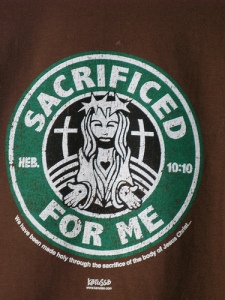5 Weaknesses Christian Bookstores Reveal in the Church
 I have nothing against Christian bookstores. I spent more than fifteen years supporting my family in Christian retail while toiling in ministry.
I have nothing against Christian bookstores. I spent more than fifteen years supporting my family in Christian retail while toiling in ministry.
For me, Christian bookstores are simply a magnifying mirror revealing some of the American church’s blemishes.
The problem
We’re talking about pure capitalism here. Bookstores have a limited amount of money to sink into inventory, so they need that inventory to turn over regularly. When you walk into a Christian bookstore, you’re looking at supply and demand at work. What you see is that people want.
Here are five weaknesses in the church that a visit to a Christian bookstore will reveal:
1. Ecumenical marginalization
There’s a street-level evangelicalism (I say “street level” because it’s pretty far removed from academic evangelicalism.) that has become the face of the American church. When the culture-at-large thinks about Christianity, they think of this vocal cross section of Protestantism that seems to be defining our collective political, moral, theological, and interpretive dialog.
This is the group that Christian publishers and bookstores cater to. To be fair, they’re the ones spending copious amounts of money, so it makes sense. But as the marketplace indulges this group, it reinforces and emboldens their ideological manifest destiny.
By largely excluding other denominational and movement voices, this mainstream evangelicalism lacks the ability to be introspective and inclusive of the rest of Christ’s body.
2. Christian nationalism
 Christian bookstores are full of art, t-shirts, and literature that marry Scripture with patriotic imagery. This fusion of God and country happens so regularly that it’s difficult for some to be appropriately critical.
Christian bookstores are full of art, t-shirts, and literature that marry Scripture with patriotic imagery. This fusion of God and country happens so regularly that it’s difficult for some to be appropriately critical.
Many outside of the U.S. are shocked and appalled at products that conflate Christianity and America having never seen such things anywhere else.
Maybe we should listen a little closer to them.
3. Anti-intellectualism
I’m not talking about simple ignorance; I’m talking about aggressive anti-intellectualism.
At any given time, you’ll find less than a handful of academic works in most Christian bookstores. In their place, you’ll find a cul-de-sac of homogenized teaching. The average person weaned on bookstore theology will assume that dispensationalism and “Left Behind” theology represent historical Christian thought.
This anti-intellectualism refuses to acknowledge that there are educated, committed believers who recognize the complexities in biblical translation and interpretation. It denies that well-meaning Christians can disagree about things like:
The nature of hell
Biblical inerrancy
Creation’s timeline
The purpose of baptism
The most complex social issues and doctrinal ideas are boiled down to pithy one-liners for t-shirts and bumper stickers. And why not? God said it. You believe it. That settles it. Right!?
4. Celebrity Worship
 You’ll generally find the biography section of any Christian bookstore fairly well stocked. And that’s great; there are amazing and inspirational stories of people who have sacrificed so much for Christ—but you won’t find many.
You’ll generally find the biography section of any Christian bookstore fairly well stocked. And that’s great; there are amazing and inspirational stories of people who have sacrificed so much for Christ—but you won’t find many.
Instead, you’ll find a selection of books written about the latest celebrities and sports stars to align themselves, however tenuously, to Christianity. This isn’t necessarily bad. It’s the lack of balance that’s troubling.
We begin a subtle undermining of the gospel’s message kingdom value when we extol the virtues of rich and famous believers at the expense of the faithful. The church desperately needs be exposed to the stories of normal people who sacrifice their time, energy, and resources for those who need mercy, justice, and advocacy.
It seems Christians have the idea that having famous believers gives Christianity credence in a celebrity-obsessed world. But let’s be honest—it probably doesn’t any more than Tom Cruise elevates Scientology’s credibility.
5. Cultural absorption
 There was a time when ingenious people with Christian ideals created timeless literature, music, and art beloved for its creativity, wit, beauty, and ideals. But when that happens now, it’s the exception.
There was a time when ingenious people with Christian ideals created timeless literature, music, and art beloved for its creativity, wit, beauty, and ideals. But when that happens now, it’s the exception.
Nowadays, the faithful want “Christian” versions of things they see in popular culture. I remember the worksheets we used to have around the bookstore that offered you a Christian alternative to the secular music you like. “Do you like Limp Bizkit? You’ll love tobyMac.” Wait . . . huh?
If a show is popular, someone will write a book drawing out dubious connections to the gospel. If a brand is popular, someone will create a shirt cleverly working in a Christian message.
It’s heartbreaking to see Christian retail virtually ignore amazing artists like Over the Rhine, Bill Mallonee, and Waterdeep who’ve been creating brilliant, engaging, and inspiring art for years.
What do you think? Am I being too hard on Christian retail? Let me know in the comments.
![]()


